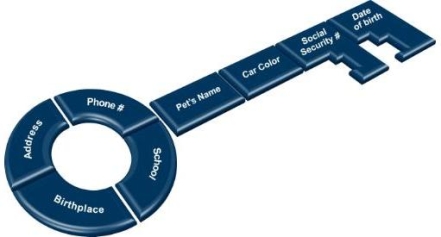Survey: Millions risk ID theft via social networks
March 22, 2011 7:08 AM PDT
Nearly 13 million American adults who use social networks are more than willing to accept friend requests from strangers of the opposite gender, a new survey from Harris Interactive has found.
According to Harris Interactive, 18 percent of men will accept a woman’s

The key to stealing a person's identity is built with just a handful of pieces. And much of that information is openly available on social networks. (Credit: Harris Interactive)
friend request, even if they do not know the person. About 7 percent of women will accept an unknown man’s friend request. A total of 5 percent of U.S. adults will accept every friend request they receive.
The results are based on a survey last month of 1,011 Americans 18 and over, including 387 who are on social networks. ID Analytics, a consumer risk-management firm, commissioned the survey, which was released today.
Leaving personal information public and allowing practically anyone to view your profile is a dangerous prospect, Harris Interactive observed. The company said that the basic information found in a social profile can help “build the dossiers [that criminals] need to beat challenge questions and other security measures on financial accounts.” It’s a sentiment with which ID Analytics agrees.
“Americans’ lack of caution in friending members of the opposite sex online is striking,” Thomas Oscherwitz, chief privacy officer at ID Analytics, said in a statement. “Friending someone online is not risk-free. Most social networking profiles contain personal information that can be used by fraudsters, and when you friend someone, you are giving them access to this information.”
One other interesting tidbit from the survey: respondents were twice as likely to say that having more business contacts than personal contacts in their list of friends is desirable.
Read more: http://news.cnet.com/8301-13506_3-20045787-17.html#ixzz1I9y92V95








